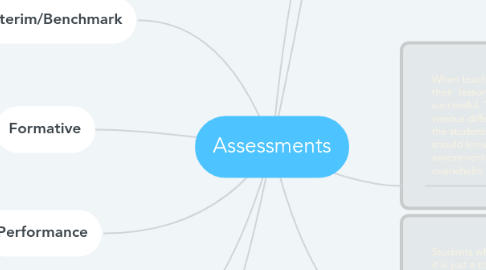Assessments
by Ana Tinoco Rivera


1. Formative
1.1. Assessment that allows you to gather evidence of student learning, providing feedback, and adjusting instruction to enhance student achievement
1.1.1. Examples: classroom discussions and quizzes
2. Interim/Benchmark
2.1. Assessments that are given throughout the school year. There is not student feedback.
2.1.1. Examples: Every six weeks assessment or chapter test.
3. Summative
3.1. Assessment given at the end of a large chunk of learning.
3.1.1. Examples: standardized tests and cumulative projects
4. Performance
4.1. Assessment where students are asked to perform a task.
4.1.1. Examples; group projects, portfolios
5. Diagnostic
5.1. Assessments that give information about the student's prior knowledge and misconceptions before starting a lesson or activity.
5.1.1. Examples: pre test,conference between the teacher and student to explore the student's thinking
6. Assessment Data
6.1. The data below is the student;s reading lexlie levels. Student1: 205L With this student the teacher could incorporate the use of diagnostic assessments before beginning the lesson. After teaching the lesson the teacher can then reteach in a small group to the student what was unclear. Student 2: 208 L. With this student the teacher could incorporate the use of graphic organizers to organize the thoughts of the student while she is reading. Student 3: 290L. The teacher could allow after school tutoring for the this student. The teacher would use the concpets that were unclear to the student and reteach them in after school turoting or small group. To know what was unclear the teacher could give formative assessments.
7. H.O.T. Questions
7.1. Opening Questions
7.1.1. How would you describe _____?
7.1.2. Do you agree with _____?
7.2. Guiding Questions
7.2.1. Why did the character feel ______?
7.2.2. What is the relationship between these two characters?
7.3. Closing Questions
7.3.1. What choice would you have made if______?
7.3.2. Was it better to ______ than to _______?
